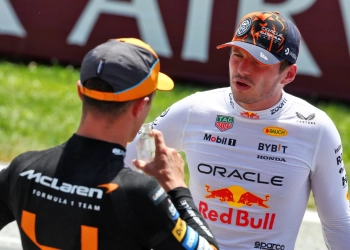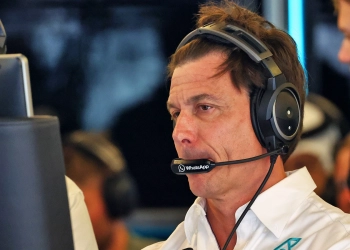The McLaren Formula 1 team has announced that Daniel Ricciardo has tested positive for Covid-19.
As a result, the Australian will be forced to miss the final day of pre-season testing in Bahrain on Saturday.
Ricciardo has already sat out Thursday and Friday’s on-track running due to feeling unwell, however it was reported that he tested negative for Covid-19 several times.
After returning a positive result on Friday, McLaren asserted that he is not due to miss the opening round of the season in Bahrain next weekend.
“Daniel Ricciardo has now returned a positive PCR test for Covid-19,” read a team statement.
“Daniel is therefore continuing to isolate in accordance with local regulations.
“Under these regulations Daniel will be released in time for next weekend’s Formula 1 Gulf Air Bahrain Grand Prix. Daniel is already beginning to feel better, and we wish him well for a quick recovery.
“Following this, we can confirm that Lando Norris will remain in the MCL36 for the final day of the official pre-season test in Bahrain tomorrow.”
The situation marks a major setback for Ricciardo and his preparations for the 2022 F1 season.
Ricciardo managed to clock 212 laps in Barcelona two weeks ago at the pre-season shakedown.
The 32-year-old released his own statement on Friday evening, which read: “Better this week than next.
“Unfortunate to miss the test, but I’m starting to feel better. I’ll stay isolated and just focus on next weekend.
“Big thanks to Lando & McLaren for the heavy lifting, I owe you some beers (milk for Lando). Appreciate the well wishes from everyone.”
McLaren has endured a difficult test so far in Bahrain, as it is dealing with overheating brakes, which is limiting its ability to complete long-distance runs.










“LATEST: The newly updated CDC guidelines don’t require testing at the end of isolation because PCR tests can stay positive for up to 12 weeks, CDC Director Dr. Rochelle Walensky tells Good Morning America.” -ABC News, Dec 29, 2021.
“The creator of the PCR test Kary Mullis said that the PCR test is not an accurate way to test for a virus years ago, long before the first outbreak of Covid-19. The test, if turned up past a 30 cycle threshold value, will give false positives for any virus.
And now, according to CDC’s Rochelle Walensky, PCR tests often produce a large amount of false positives.
Noting that these unreliable tests can stay positive for up to 12 weeks after infection, Walensky warned ‘we would have people in isolation for a very long time if we were relying on PCRs.'”